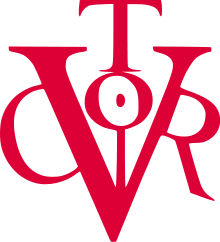Victor (symbol)


.jpg)
The victor symbol (Spanish: víctor or vítor) is an emblem that is painted on the walls of some Spanish and Latin American universities to commemorate students who have received the degree of doctorate. The custom dates back to the 14th century, and the symbol has historically been used at the University of Salamanca,[1] the University of Alcalá, the University of Seville,[2] and some universities in Latin America such as the National University of San Marcos in Lima, Peru.[3] According to the custom, when a student receives the doctorate, the victor symbol is painted on the walls of the university in red or black paint along with the student's name.
At the end of the Spanish Civil War, the victor sign was adopted as a symbol of the nationalists' victory in the war, and it came to be used as a personal emblem for the dictator Francisco Franco. Despite its former use by Franco, it is still used in its original sense at several universities.
The victor symbol takes the shape of the letters V, I, C, T, O, and R arranged in a stylized fashion that varies from symbol to symbol. In some cases, the letter C is omitted. Usually, the name of the student is painted alongside the symbol. The symbol is sometimes used to commemorate a notable person that visited the university or has some special connection with the university.
References
- ↑ La tradición de los vítores salmantinos, 19 December 2007.
- ↑ El misterio de los vítores. La limpieza de la catedral de Sevilla ha sacado a la luz diversas inscripciones, El País, 11 October 2009.
- ↑ Juan Carlos Talavera, Vítores y “hieroglificos”: celebraciones triunfales en la ciudad de Lima.
